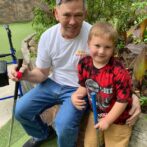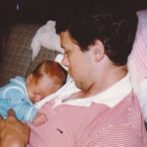Snapshots of Dementia: Living His Best Life
Tom with Lincoln and Lando, Father’s Day, 2023 When I made the decision to sell our home in the Orlando area and move to South Carolina to be near family, I often told people I hoped to “give Tom his best life.” At the time, I had little idea what that meant. So how do we give Tom his best life even while his brain continues to change? I’m still figuring it out. But here are some of the things that seem to help, despite many mistakes along the way. — ROUTINE: I’ve mentioned before how Tom can easily become agitated if too much of his routine changes. He likes to go out and enjoys being with friends and family, but he likes being home even more. We haven’t done much traveling since his diagnosis, but I’ve learned that trips go much better if I can keep mealtime, bedtime, and time for playing games on his iPad as close as possible to what we do at home. — FAMILY TIME: We spend most Friday nights with our oldest daughter and her family, who live nearby. Tom looks forward to this routine and especially to time with our two young grandsons. He also enjoys holidays, birthdays, and other family events. Earlier this spring, our youngest daughter blessed us with two week-long visits. And although our son hasn’t been here as much as he anticipated, every time he returns, Tom gives him a big hug and says how much he missed him. Relationships have always mattered to Tom, but while LWD, family seems to matter even more. — SOCIAL/SPIRITUAL: Attending church and singing in the choir and senior choir are becoming more challenging for Tom, but he still enjoys both. We stay active at church because it’s long been our priority and also because it’s a safe and healthy place for Tom. Friends there have consistently shown their concern for both of us, helping me get him safely from one place to another and making sure he’s not left out or left behind. I have long believed that those with cognitive challenges can still have a strong connection to God, and this holds true for Tom today. — DIET: I wrote here about some ways caregivers can stay healthy, and those choices have had an impact on Tom. I don’t experiment with new dishes too often; with his love for routine, familiar foods and longtime favorites make him happy. And although (with his doctor’s permission) I still ensure he has regular Wendy’s Frostys and other treats, I have shifted his diet to include more fruits, vegetables, and whole grains. Living his best life means staying as healthy as possible while his...
Read More









